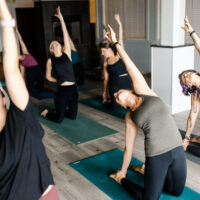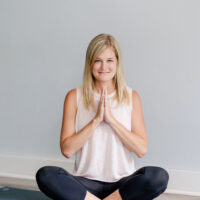4 Key Benefits of Yoga Backed by Science
If you are like most people, you associate the benefits of yoga with things such as increased flexibility and better balance. From my experience, most people (including me) first went to a yoga class for the ways they heard it can help with common concerns like aches, pains, tension, tightness, strength-building and even weight loss. What many don’t realize until they start taking yoga classes regularly is the array of other benefits that come with the traditional components of a well-rounded yoga class, which included mindfully moving your body, breathing more consciously and focusing the mind.
Through diving deeper into the research and studies on yoga, I learned that according to the National Health Institutes 2017 survey, yoga is the most commonly used complementary health practice among adults, with 14.3% of US adults using yoga for wellness purposes. This is up from 9.5% in 2012. Hearing that more and more people are uncovering and experiencing the powerful benefits of yoga in their lives makes my heart sing!
I could write a book sharing all of the latest and greatest research and statistics on yoga, but instead I’ll share some of my favorite benefits and a few studies that support these. Hopefully these will inspire you or someone you love to get started with what I’ve found (and I know many others have, too) to be a pivotal practice for optimizing not just my physical health, but also my mental, emotional and spiritual wellness.
- Yoga reduces stress and associated symptoms of stress – the “s” word seems to have become somewhat of an epidemic in our society as we are challenged with meeting the demands of life. While you can’t always avoid stressors, you can learn to not let them “stress you out” and you can rely on tools you learn through yoga such as breathwork and mindfulness to lessen the effects of challenging circumstances on your body and mind.
One study found that after just 3 months of consistently practicing yoga, subjects had a decline in perceived stress and cortisol (the body’s main stress hormone) levels were lowered. Another study done with a group of women found that after just 12 yoga sessions, yoga significantly reduced stress, depression and anxiety. Speaking of anxiety, let’s move onto #2…
- Yoga reduces feelings of anxiety – anxiety can have a crippling effect on one’s life. Whether it’s panic disorders, social anxiety or anxiety related to post traumatic stress, I’ve come across far too many people silently and deeply struggling with the emotions and physical symptoms related to persistent anxiety.
While cognitive behavioral therapy is still the gold standard in treating those with anxiety disorders, there have now been several studies that show yoga as a promising complementary practice for those struggling with both anxiety and depression. One analysis that looked at 17 studies that spanned over 500 participants, showed yoga as an effective treatment for those dealing with anxiety, with the greatest impact felt from those who reported the highest levels of anxiety at the outset of the study.
- Improves mood – I will sometimes say in class, “if everyone did yoga, the world would be a better place.” I say it light-heartedly, but do in fact believe this due to the elevated mood you can experience after a yoga. I’ve never gone to a class where I left feeling worse than when I arrived. There’s something powerful and inspiring about moving your body mindfully, slowing down and listening to your breath and perhaps most importantly, unplugging your mind from as much of the day to day thinking as is possible for an hour and simply focusing on what you are doing in the moment. And to do this in a room full of others is just magical.
That’s all experiential, but there is science to back up my feelings. In a 2010 Boston University Medical School study, researchers found that after practicing yoga 3 times a week for 12-weeks, GABA (a neurotransmitter that sends signals regarding behavior, cognition and stress responses to the nervous system) levels increased in the brain. The study also included subjects who participated in a walking program and found that those who participated in the yoga program experienced greater improvements in their mood than the walkers.
- Stimulates brain function – You might say yoga makes you smarter. While it might not exactly raise your IQ, it will help you better focus, retain information, alleviate brain fog and help you feel all together more “with it.” With an estimated 34 gigabytes of information coming at us each day, it is easy to feel scattered, unclear and mentally exhausted. Yoga gives you the opportunity to unplug from the constant barrage of things coming at us and in turn, we have the chance to find a little space, quiet and peace in our minds. Utilizing the breath in addition to tuning into the physical sensations of yoga poses can help us focus on what is happening in the moment and train our brains to be less distracted.
A 2012 study found that even after just one session of yoga, subjects experienced greater cognitive performance, especially when it came to shorter reaction times and increased accuracy. This performance was not only greater than the pre-yoga session baseline, but it was also greater than subjects who participated in one session of aerobic exercise.
Perhaps in addition to helping you get stronger and more flexible, yoga may also help you live a little smarter and happier. I’ve heard many clients over the years tell me that while they started yoga for the physical benefits, it’s the mental and emotional benefits that keep them coming back on a regular basis. While having strong triceps and flexible hamstrings is nice, what’s even better is living life with greater ease, joy and peace of mind.
And last little note on this – you’ve ultimately got to find the right wellness formula for you – one that meets your specific needs and goals. Yoga is fantastic, yes. With the variety of styles, tools and techniques, there seems to be something out there to help everyone. But, it’s not always the end all be all. I find when combined with other wellness practices and/or therapies, you can create a powerful foundation for a life of health and happiness. Try, explore, find what works and most importantly be consistent!
Alissa Rodgers, eRYT500, has been a yoga student for over 16 years and has taught yoga for over 10 years. As founder and co-owner of GoYoga, a Columbus, OH based group of 8 yoga studios, she is passionate about sharing the tools of yoga in a way that is accessible to the masses. She started her company after not being able to find a local yoga studio that provided a straight-forward, yet inspiring and powerful approach to yoga. This soon turned into a passion to share yoga and its benefits with as many people as possible. In addition to leading her studios, teaching yoga and training yoga teachers, she’s a mom of 3 boys, an avid reader and a lover of the beach (which she doesn’t get to often enough living in Ohio!).
Practice in Columbus or online with Alissa or a member of her team by schedule a class here.





